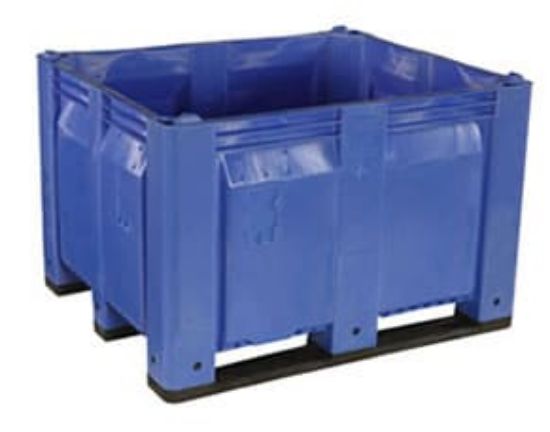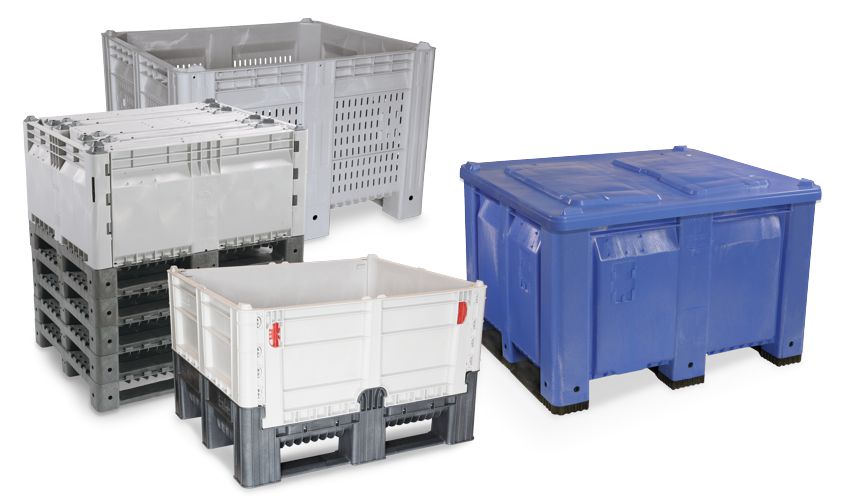The Ultimate Overview to Selecting the Right Mass Containers for Your Service Requirements
Choosing the ideal mass containers is vital for any type of company that counts on effective logistics. Numerous kinds of containers exist, each developed for certain products and applications. Aspects such as size, product compatibility, and governing criteria play a considerable function in this decision-making process. Recognizing these aspects can result in improved functional effectiveness. However, lots of services neglect important aspects that can enhance their overall effectiveness and sustainability. What are these factors to consider?
Recognizing Various Kinds Of Bulk Containers
Mass containers function as vital tools for organizations looking for efficient storage space and transportation options. These containers can be found in different kinds, each made to fulfill specific operational needs. One usual kind is the intermediate bulk container (IBC), which is excellent for liquid and granulated products, providing a balance of ability and maneuverability. Another prominent alternative is the bulk bag, or FIBC, appropriate for completely dry, flowable items. These versatile containers are lightweight and can be easily moved and stored. For much heavier products, rigid mass containers are usually used, giving durability and stability for secure handling. Additionally, there are specialized containers tailored for dangerous products, making certain conformity with security guidelines. Understanding the distinctive features of these mass container kinds allows companies to make educated decisions that optimize logistics and minimize prices. By selecting the best container, business can enhance their operational efficiency and streamline their supply chain processes.
Trick Product Factors To Consider for Bulk Containers
When selecting mass containers, it is important to ponder the materials made use of in their construction. Aspects such as longevity, strength, and chemical compatibility play a vital function in making sure the containers meet specific operational needs. In addition, weight and portability worries can affect both efficiency and transport logistics.
Product Longevity and Toughness
Resilience and stamina are important aspects in picking materials for bulk containers, as they directly influence the container's ability to hold up against numerous environmental problems and taking care of processes. Products such as high-density polyethylene (HDPE), polypropylene, and stainless steel are commonly preferred for their robust properties, using resistance to temperature, influence, and abrasion changes. The choice of material also affects the total life-span of the container; stronger products generally lead to less frequent replacements, resulting in cost financial savings gradually. Additionally, the weight of the product can influence shipping expenses and ease of handling. Companies need to consider their certain functional settings and the possibility for deterioration to assure peak resilience and toughness in their bulk container option.
Chemical Compatibility Variables
Comprehending chemical compatibility is important for picking mass containers, as the materials made use of should resist the certain materials they will hold. Different elements affect compatibility, including the chemical nature of the contents, temperature, and duration of storage space. Corrosive chemicals might need containers made from stainless steel or specialized plastics that resist destruction. In addition, responsive compounds can produce warmth or gases, requiring vented or pressure-rated containers. The selection of container material, whether metal, polyethylene, or polycarbonate, must straighten with the chemical buildings of the saved compounds to prevent breaches or leakages. Inevitably, a thorough examination of these compatibility factors assures safe handling and storage, safeguarding both employees and the atmosphere while keeping product honesty.
Weight and Transportability Concerns
Selecting mass containers entails not just evaluating chemical compatibility but also considering weight and portability. Services have to assess the convenience of handling and transport to maximize efficiency. Lightweight products like high-density polyethylene (HDPE) or aluminum can assist in easier activity and decrease shipping prices. Alternatively, much heavier containers might supply boosted durability however can prevent mobility, particularly in settings needing regular moving. Furthermore, the layout of the container must permit convenient lifting and stacking, ensuring ergonomic safety for employees. Companies should likewise take into consideration the infrastructure available for transport; for instance, containers compatible with forklifts or pallet jacks can simplify operations. Ultimately, the best equilibrium in between weight and mobility straight influences operational performance and price efficiency.
Sizing Your Mass Containers for Optimal Performance
When sizing mass containers, businesses should meticulously analyze the dimensions called for to fit their details products. In addition, weight ability is a vital factor that affects efficiency and safety and security during transportation and storage space. Effective sizing not just makes best use of area yet also maximizes functional workflows.
Establishing Container Capacities
Choosing the right dimensions for mass containers is important for maximizing efficiency in storage and transportation. Services need to assess their details needs, taking into consideration aspects such as offered space, the nature of the items being stored, and the techniques of transportation made use of. Accurate measurements guarantee that containers fit ideally in stockrooms and cars, minimizing wasted area and reducing handling time. Standard sizes can offer convenience, however customized measurements could be required for special requirements or to fit particular items. In addition, it is necessary to examine stacking capacities and accessibility, as these aspects affect overall functional effectiveness. Inevitably, the right dimensions lead to boosted company and structured logistics, profiting the general productivity of the company.
Weight Ability Considerations
Understanding weight capacity is essential for businesses intending to enhance their bulk container effectiveness. The weight capability of a container directly influences storage space capabilities, transport logistics, and general functional costs. Picking containers with the appropriate weight restrictions ensures that businesses can securely store and transfer their products without running the risk of damage or compliance problems. Straining containers can cause structural failings, while underutilizing capacity cause squandered sources. When selecting containers, it is vital for companies to assess their product weights and consider any kind of regulatory demands. Furthermore, variables such as the sort of material, intended use, and environmental problems ought to likewise affect weight ability choices. By examining these aspects, organizations can enhance efficiency and guarantee a structured supply chain.
Governing Conformity and Safety Criteria

Governing compliance and safety criteria play an important function in the choice of mass containers for services. Organizations has to ensure that their containers satisfy numerous policies set by regional, national, and global authorities. These criteria typically refer to product security, structural honesty, and correct labeling, which help stop accidents and guarantee the safe transport of goods.
Furthermore, adherence to industry-specific guidelines, such as those from the Fda (FDA) or the Occupational Safety and Wellness Management (OSHA), is crucial for companies dealing with hazardous products or food products. Non-compliance can cause penalties, lawful concerns, or damages to a company's track record.
Services should additionally think about the container's compatibility with the products being kept or carried to stay clear of contamination or chemical responses check this site out (used plastic containers). To summarize, comprehending and implementing regulatory compliance and safety and security requirements is crucial for the reliable and liable use bulk containers
Sustainability Alternatives for Eco-Friendly Bulk Containers

Business are also checking out choices made from recycled materials, which not just preserve sources but additionally support the reusing market. Furthermore, developments in style allow for lighter containers that require less energy to transportation, further improving sustainability. By incorporating these environmentally friendly bulk container options, companies can show their dedication to environmental stewardship while fulfilling consumer demand for sustainable techniques. This shift not only assists the planet but can likewise boost brand name track record and customer loyalty.
Cost-Effectiveness and Budgeting for Mass Containers
While many organizations concentrate on sustainability, cost-effectiveness continues to be an important aspect when selecting mass containers. Organizations must examine the initial purchase cost, along with lasting functional prices, to assure economic viability. Variables such as reusability, resilience, and upkeep play a significant function in determining general costs.
Investing in high-grade containers may produce greater upfront costs yet can bring about financial savings via lowered replacement rates and more info here reduced waste. Furthermore, companies need to consider transportation costs and storage space effectiveness, as these can affect the total budget plan.

Often Asked Questions
Just how Do I Establish the Right Container for Hazardous Products?
To determine the right container for unsafe products, one must examine compatibility with the compound, think about the container's product, look for regulatory conformity, and examine capacity and security attributes to ensure proper handling and storage space.
Can Bulk Containers Be Personalized for Certain Products?
Yes, bulk containers can be personalized for specific items. used collapsible bulk containers. Different functions, such as layout, size, and product, can be customized to satisfy distinct needs, making certain suitable safety and security and effectiveness for transporting and storing various items
What Is the Average Life-span of Different Mass Container Kind?
The typical lifespan of bulk container types differs; plastic containers last 5-10 years, metal containers 10-20 years, and wood containers generally last 3-7 years, depending on usage, upkeep, and environmental conditions.
Just how Should I Tidy and Maintain Mass Containers?
To clean and keep bulk containers, one need to frequently inspect for damage, remove residue, clean with proper detergents, wash completely, and warranty appropriate drying out before storage. Following maker standards boosts durability and security throughout use.
Exist Rental Alternatives for Bulk Containers Available?
Yes, countless companies offer rental options for bulk containers, offering flexibility for companies. These rentals can fit various requirements, enabling business to take care of stock successfully without the dedication of buying containers outright.
Toughness and stamina are important variables in choosing materials for mass containers, as they directly influence the container's ability to endure various ecological problems and handling processes. Understanding chemical compatibility is essential for selecting mass containers, as the products made use of need to withstand the details compounds they will hold. Comprehending weight capacity is important for services intending to optimize Web Site their bulk container performance. Regulatory compliance and safety requirements play a vital function in the selection of mass containers for companies. While several companies focus on sustainability, cost-effectiveness remains an essential element when picking mass containers.